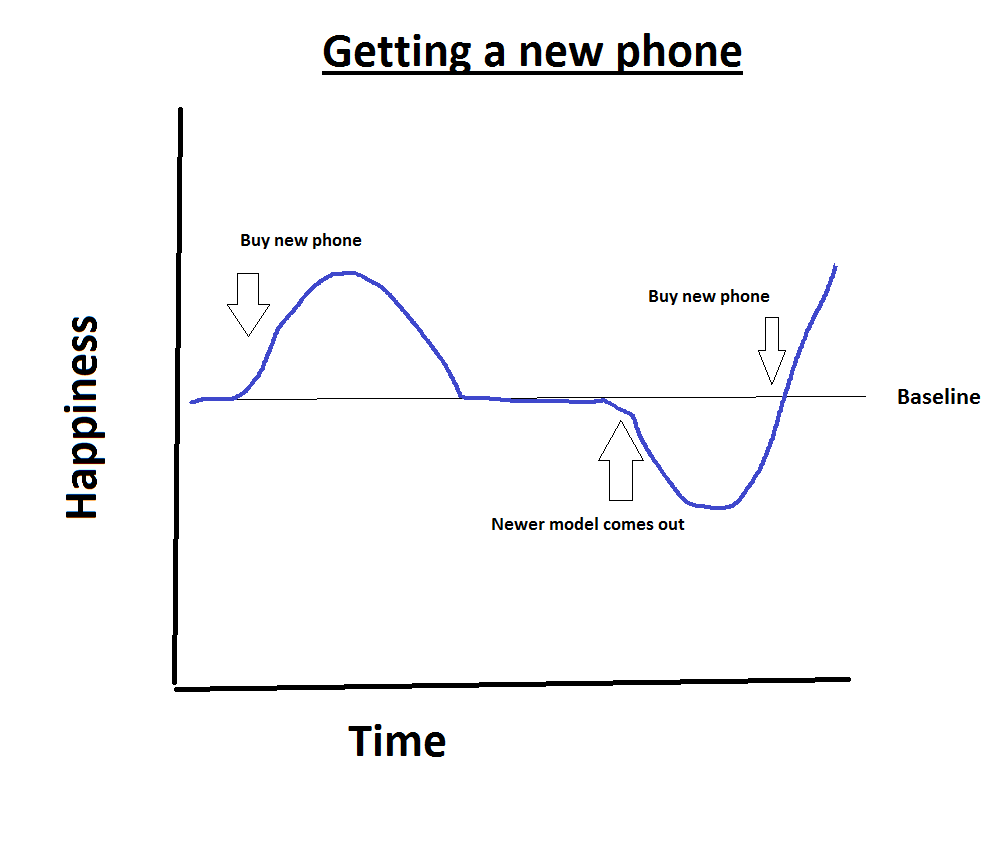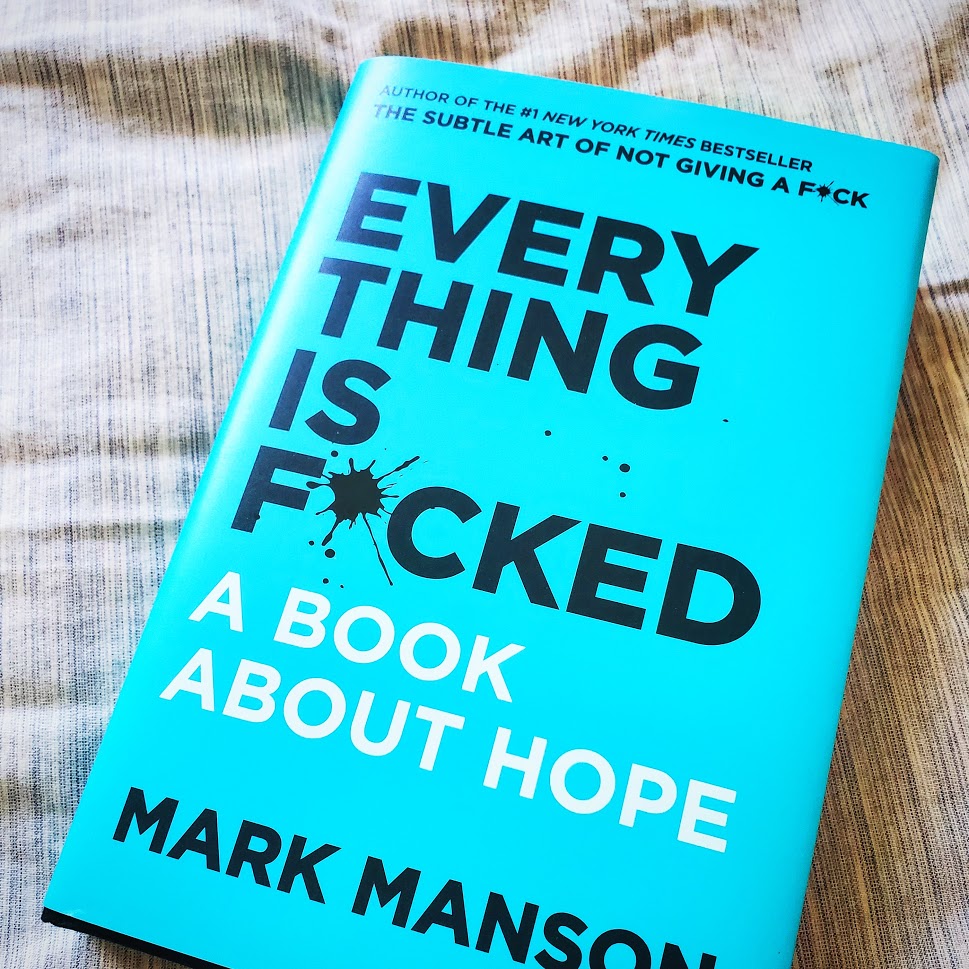If you read books at all, it’s likely you’ve seen one of Mark Manson’s books on the shelf of your local book store or on the top of Amazon’s best-seller lists. With bold, black, capital letters, two of his three books have made the New York Times bestseller’s list; all while openly flaunting a title with one of the most explicit curse words in the English language. His books, The Subtle Art of Not Giving a F*ck and Everything is F*cked, provide an introspective dive into the deep-seated ideas and beliefs most of us have in pursuit of a happy and fulfilling life. All the while throwing in F-bombs and sprinkling in some dark humor, it leads to an enjoyable read.
In fact, it is likely that one of the reasons Mark Manson has become so popular is his pursuit to disseminate thought-provoking ideas from the field of psychology, sociology, and philosophy into manageable bite-sized morsels that can be consumable by the average reader. All while still being fun to read, which, of course, is no easy task. It can be incredibly challenging to take complex ideas and make them sound exciting. An in-depth analysis of the theories of human emotion? Sounds like a snooze fest. But, a parallel universe where a cantankerous Issac Newton decides to use his superior intellect to dissect the underlying principles of the metaphysical world (human psychology) instead of the physical world (gravity and stuff)? That sounds a bit more fun to read!
Although Mark talks about many ideas in his book, I wanted to share some that I thought were the most thought-provoking and interesting. If these topics sound interesting, I would recommend checking out his books to get the entire experience.
1. We’re All Going to Die Some Day
Sorry to start off with such a depressing topic. But, it’s true! Every single one of us will die one day. It’s the inevitable truth that gives us all sorts of anxiety and fear when we think about it for too long. As far as we know, we’re one of the very few mammals who are aware of our own mortality, which then leads to the question, “what happens when we die?” Humans have been searching for this answer since our existence and still don’t have an answer (and likely never will). Maybe there is a heaven that’s free from suffering and has a bunch of naked babies flying around giving you free hugs. Maybe you reincarnate into a dung beetle because you didn’t call your mom enough once you started a family. Or, maybe nothing happens and you cease to exist in this world. Woah, that all sounds pretty terrifying!
So, how do we get through our everyday life knowing that someday something will happen and we won’t be around anymore? For many of us, we take to external substances to distract ourselves from this uncomfortable knowledge. Drugs, alcohol, television, and social media usually do the trick. By constantly distracting our curious mind, we can continue to delay the unavoidable truth of our mortality. But, this is not entirely a solution. Once we sober up or we finish binge-watching The Office for the sixth time, reality begins to settle in again. We realize that the time we spent distracting ourselves is now gone and the internal clock on our mortality continues to tick down, minute by minute. So, time to watch The Office for a seventh time, right?

Although this method can distract us until we flat-line, it doesn’t seem incredibly conducive to a fulfilling life. Instead, it may be more beneficial to take the time to accept our inevitable mortality and decide on how we’re going to spend the time we have on this planet. There’s a reason why people work themselves to the bone to do amazing (or amazingly horrific) things. As much as it may make you cringe, there is one similarity between Martin Luther King Jr. and Jeffery Dahmer; I can type both of their names and most of you reading know who they are. Through both of their actions, they made an incredible impact on countless lives; for better or worse. When human beings engage in actions that are an impact on society, they become immortalized in our history books. Yes, their lives have ended. But their legacy continues until they too may become forgotten. It’s a weird way of “expanding” the time we have to live.
You can apply this concept to yourself. Maybe you will be the next Steve Jobs, Jeff Bezos, or even Jeffery Epstein ( try your best not to be this dirt-bag, though). However, it is much more likely that your reach will be smaller. This doesn’t change the fact that you can be immortalized after your death, just like the most impactful people in the last 1,000 years. By sharing your wisdom and mentoring the younger generation, they will take those ideas with them throughout their entire lives. By pushing yourself in your career, you can create a lasting impression on the company for decades after you’ve moved on. By being an ideal role model for your family, you can influence them to become better human beings; potentially leading to them becoming the next Barack Obama or Mahatma Gandhi.
Despite whatever your beliefs are on death and the afterlife, we all know there’s only so much time we have with the life we’re currently living. How will you be remembered? As someone who was able to play video games for 12 hours a day with only two bathroom breaks? Or as someone who made an impact on the world and its inhabitants, no matter how small? It all depends on how you use your time.
2. Most of Us Care Too Much About Everything
Yep, even you. There are many times in life where we care too much about one thing; and sometimes, everything.
When I was in my early 20’s, this rang true more than ever. After spending most of my teenage years in front of a computer screen playing World of Warcraft, I didn’t have much of an identity except, “I like video games and drinking soda.” So, I began to latch on to ideologies that (I thought) gave me a better understanding of who I was and what I stood for in the world. So, like many young adults, I became immersed in animal rights. I drastically shifted to a raw foods diet, watched every documentary on veganism I could find, and immersed myself in the culture. It felt good doing things that were “obviously right” both morally and ethically. I had a hard time understanding how anyone could have a different opinion from me. Are they stupid? Why would they want to eat meat and abuse animals? They just don’t understand! However, over time this ideology began to seep into other causes. Underpaid (or slave) labor in third-world countries, the homeless epidemic, and inequality of minorities, just to name a few.
Don’t get me wrong! In essence, these are wonderful causes and bringing awareness to these issues is inherent in finding a solution or compromise in the long-term. However, as an individual person, wanting to “save the world” ended up making me stressed, resentful, and angry. The problem is that I cared too much; not only about the causes that meant so much to me, but also about what people thought about me. I would go to my classes, hoping that someone would ask how I thought on a particular issue so that I could show them how virtuous I was. I wanted people to “ooh” and “ahh” when I showed them how knowledgable I was on the topic. It was a hope that rarely came to fruition. Mostly because everyone is in their own world, hoping for the same exact thing.
In the end, I realized that validation from others was the biggest contributing factor in my new identity; not from some intrinsic desire. As disheartening as that was for me to realize, it’s not an uncommon realization. So many people in our society today are struggling with finding themselves and begin to latch onto other’s ideologies so that appear to provide value and meaning into their lives. But, this usually leads to people caring way too much about something, or even everything, in their daily lives.
If you want an example of this, just look at the cesspool that is Twitter. Full of angsty young adults, a handful of typed words can quite literally implode an individual’s career and put their lives at risk. When someone’s tweets are considered “wrong” or “unjust” from a specific group of people, they grab their pitchforks and attack with lethal accuracy. They care so much about signaling their virtue, morality, and rightness that they feel it is justified to make the offender’s life a living hell. Because, screw that guy, right? That issue is important to you. So important, in fact, that the mere idea that they have a different opinion threatens the entire structure of their ideological identity. How dare they!?

Except, the same question begins to rise to the surface. Does attacking others bring value and meaning to your life? Does it actually progress the cause that you’re so passionate about? Is this an intrinsic desire, or are you more worried about what others will think about you? When we care too much without thinking deeply about the why, a horrible side of us begins to come out; and it’s not pretty to watch.
3. Striving for Happiness Sometimes Has the Opposite Effect
This is an incredibly frustrating concept for most people. Living in the modern world, we have most of our basic needs met. The need to constantly be on the search for our next meal and protect ourselves from being eaten by predators is now reserved for edgy survival shows. If you’ve ever watched Naked and Afraid, you might understand what I mean. The contestants on this show are stripped of all their worldly possessions (including their clothes) and placed on some remote area. They have to find shelter, food, water, and try to not kill each other in frustration during the process. You can see the immense stress that comes with not knowing where you will sleep and what you will eat for the next day. But, you also see something interesting; the immense joy that the contestants have when they’re one step closer to survival. Catching a squirrel or finding a puddle of dirty drinking water can bring such joy that it brings them to tears.
But, then it turns to commercials and you come back to reality. With the AC blasting, your microwave meal on your lap, and your empty can of Arizona iced tea resting on the table, you may find yourself feeling unhappy. What the heck is with that? You have pretty much everything you could ever want. Right?
Not exactly. As the big corporations in society would like to remind us, our lives kind of suck. But, if we buy their product? Then our lives will truly be complete! So that’s what we strive for. Better cars, nicer skin, whiter teeth, bigger houses, and even purer dogs. If my pup isn’t a purebred Corgi, then I send it back!
This usually leads us to have a short burst of joy, followed by an inevitable return to baseline, with some potential dips below baseline depending on our perception of new products that can make us “happy.” Let’s take an example I’m sure many of you have had; buying a new phone. At first, when buy a new phone you’re absolutely STOKED. It has so many new features: takes great pictures, runs so much faster, and looks so much nicer than you’re dumb old phone. But, after a month or so, those feelings fade away and it becomes just a normal part of life again. Then, a few months after that, a new model is released and you may start to get resentful of your current phone. Now it has fewer features: takes worse pictures, runs like a snail, and looks so much dumber than that new phone. So, you begin to see your friends with this phone, taking beautiful selfies and talking about their new phones like someone who just got a girlfriend after being single for 5-years. You become so discouraged that you give in, trading your old phone for that new model, making you feel great once again! And the cycle repeats.

This, my friends, is known as the Hedonic Treadmill. A fun play on words, the term is a good representation of the futility of chasing after happiness. Similar to a treadmill, you can run 1, 5, or even 20 miles, but still be in the same exact location. If you’re trying to get some exercise while it’s hailing outside, then that may be a reasonable outcome. If you’re trying to get somewhere, then it’s not the most effective method of travel. In a study by Brickman, Coates, and Janoff (1978)1, they compared happiness levels of lottery winners and accident victims. As you may expect, after a brief increase in happiness from the lottery winners and the brief decrease from the accident victims, just like with buying a new phone, their happiness returned to comparable baseline levels. Even more interesting, the lottery ticket winners found it harder to enjoy simple experiences in life, suggesting that the lottery ticket winners may be worse off than the accident victims in the long term. Of course, this does not account for individuals who experience intense and repeated trauma2, but some sense of baseline of our happiness almost always occurs with both positive and negative experiences.
A wonderful book, The Happiness Trap, Russ Harris does a great job of explaining our difficulties with dealing with this phenomenon, calling it the “struggle switch.” When we hit baseline or lower levels of happiness, we may begin to struggle with trying to hit that happiness high again. However, this struggle may actually cause our negative thoughts to run rampant. “Why is it so hard to find happiness?” and “I can’t seem to be happy with what I have.” are just a few examples of what might come to mind. But, instead, if we just allow happiness to just be what it is, allowing ourself to accept the normal ups and downs of our emotions, it can be more tolerable to stay in our baseline or lower levels of happiness; truly appreciating the times when we do feel times of unsurmountable joy.
Because isn’t that what life is? A mix of pleasure and pain. This isn’t a new concept, of course. The idea of yin and yang, displaying that two opposing forces are in fact complementary to each other. Without suffering, there would be no joy. So, don’t try to be happy. Just do your best not to be unhappy, instead.
Sources
1. Brickman, P., Coates, D., & Janoff-Bulman, R. (1978). Lottery winners and accident victims: Is happiness relative?. Journal of personality and social psychology, 36(8), 917.
2. Anke, A. G., & Fugl-Meyer, A. R. (2003). Life satisfaction several years after severe multiple trauma–a retrospective investigation. Clinical Rehabilitation, 17(4), 431-442.






